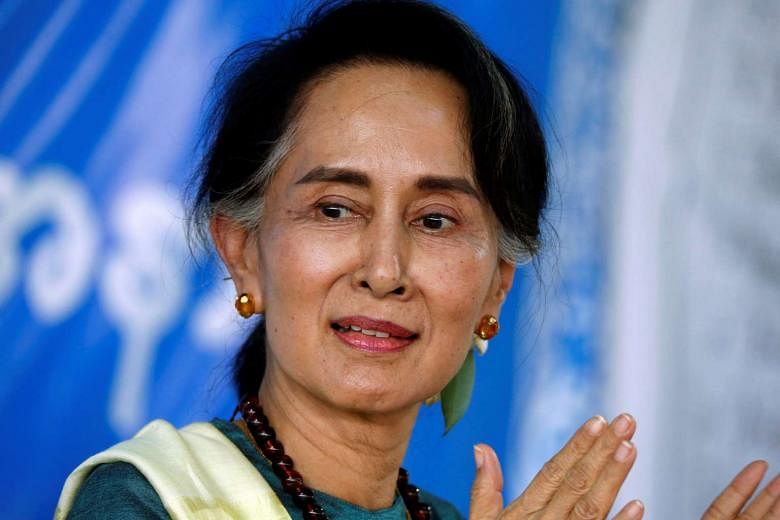YANGON - Myanmar leader Aung San Suu Kyi on Thursday (March 30) asked for support from her country amid growing impatience about the slow pace of changes initiated by her civilian administration.
In a speech aired on state television on Thursday night to commemorate the first year since her National League for Democracy (NLD) party took power, she said: "We need to show that our government works for our people. But, we also need support from our people. We rely on each other."
She also promised that the NLD would not monopolise all government positions.
"We will return the position if there is someone who can do this better than us," she said, while thanking her government's supporters.
"There were groups that criticise us. But our people support us, and understand our government."
Ms Suu Kyi made the comments as Myanmar prepares for a by-election on Saturday (April 1). This would be her party's first test at the polls since it won a landslide victory in the 2015 general election, sparking hope for a new dawn in an impoverished country wracked by five decades of military rule.
Just 19 seats will be up for grabs, 12 of which are national legislature seats out of a total of 664 in the upper and lower houses. While the results will not challenge the NLD's dominance, they will be a key gauge of public sentiment one year after she assumed power.
Ms Suu Kyi is bound by a military-crafted constitution to share power with the armed forces which controls one quarter of all parliament seats as well as the key security portfolios of defence, interior and border affairs.
Analysts, who noted how expectations of her government were "sky high", have increasingly criticised it. They say that it lacked transparency, was over-centralised its decision-making and slow in drafting economic policy, as well as muddled through negotiations needed to create sustainable peace with the country's numerous ethnic armed groups.
Meanwhile, an attempt to name a bridge in Mon state after Ms Suu Kyi's father and independence hero Aung San has raised fears about increasing dominance of the Bamar majority vis a vis Myanmar's numerous other ethnic groups.
In the north of the country, a flare-up of hostilities between the military and ethnic armed groups that has displaced thousands has raised questions over the feasibility of Ms Suu Kyi's focus on national reconciliation during her first year in power.
While she reordered peace negotiations with the country's numerous armed groups, in order to get buy-in from the non-signatories of a ceasefire agreement that was inked in 2015, she has been accused of dealing with their representatives in a high-handed manner.
"The peace process is very difficult," she said yesterday. "Sometimes we go forward, sometimes we step back. But our goal is to move ahead."
She added that while she appreciated help from other countries in the peace process, it remains "our duty".
Ms Suu Kyi has also drawn flak for not speaking out against widespread allegations of the rape, torture and killings of Rohingya Muslims in Rakhine state since a military crackdown in the area from October last year. Myanmar rejected a bid by a United Nations human rights body to send a fact-finding mission to the country on this issue.
On this matter, Ms Suu Kyi said: "We did not accept it, but it does not mean we do not respect the UN. Their decision is just not suitable for our country."
Against a backdrop of depressed oil prices, foreign investment in the resource-dependent economy is set to drop by some 30 per cent in the fiscal year ending March 31. According to World Bank projections, economic growth will also slow to 6.5 per cent during the same period, though it is expected to pick up in the coming year.


